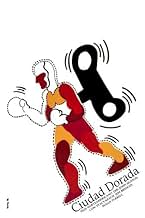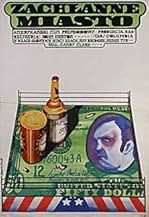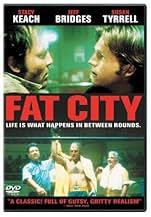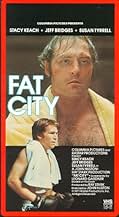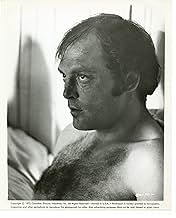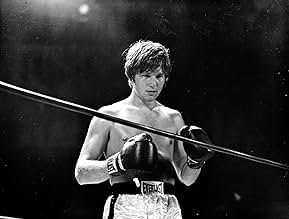NOTE IMDb
7,2/10
11 k
MA NOTE
Deux hommes qui travaillent comme boxeurs professionnels en viennent aux mains lorsque leurs carrières respectives prennent des tours différents.Deux hommes qui travaillent comme boxeurs professionnels en viennent aux mains lorsque leurs carrières respectives prennent des tours différents.Deux hommes qui travaillent comme boxeurs professionnels en viennent aux mains lorsque leurs carrières respectives prennent des tours différents.
- Nommé pour 1 Oscar
- 4 victoires et 4 nominations au total
Álvaro López
- Rosales
- (non crédité)
Carl D. Parker
- Paymaster
- (non crédité)
Bill Riddle
- Boxer
- (non crédité)
Al Silvani
- Referee at Tully-Lucero Fight
- (non crédité)
Avis à la une
The down-to-earth tale of two small hall boxers -- at the opposite ends of their careers -- and the blows they take in and out of the ring.
This is one of the best American movies ever about normal working class lives where failure is common and the only thing you can do is pretend otherwise or drug it all away to nothing. I know why so many people prefer Rocky to this -- this is too real for them. Indeed it is almost too real for me!
Stacey Keach was given the role of lifetime in this. He really does look like a failing boxer turned to flab (although maybe that is nature -- not punches!) trying to find a life (of sorts) beyond the ring. Bridges really does look and sound like the daydreamer believer that makes the boxing game go round. Johnny No Talent who thinks he is Mike Tyson when his face finally clears up.
They don't make films like this anymore. The Europeans can, although they are rarely shown and end up too self indulgent. Everyone here gets what they deserve, which is sadly, very little. That is what sport is about in real life -- lots of people failing so that are very small few can succeed. The best the majority can hope for is some exercise and comradeship.
(This contrasts with most sports movies -- which are about glory. Or at least glory through struggle.)
This is the best late John Huston film and every single frame is a frame of reality and believability. Maybe that is what leads so many people to say "so what", the world outside their window has many of the same elements and there are many times you feel you are -- indeed -- looking at real life.
This is one of the best American movies ever about normal working class lives where failure is common and the only thing you can do is pretend otherwise or drug it all away to nothing. I know why so many people prefer Rocky to this -- this is too real for them. Indeed it is almost too real for me!
Stacey Keach was given the role of lifetime in this. He really does look like a failing boxer turned to flab (although maybe that is nature -- not punches!) trying to find a life (of sorts) beyond the ring. Bridges really does look and sound like the daydreamer believer that makes the boxing game go round. Johnny No Talent who thinks he is Mike Tyson when his face finally clears up.
They don't make films like this anymore. The Europeans can, although they are rarely shown and end up too self indulgent. Everyone here gets what they deserve, which is sadly, very little. That is what sport is about in real life -- lots of people failing so that are very small few can succeed. The best the majority can hope for is some exercise and comradeship.
(This contrasts with most sports movies -- which are about glory. Or at least glory through struggle.)
This is the best late John Huston film and every single frame is a frame of reality and believability. Maybe that is what leads so many people to say "so what", the world outside their window has many of the same elements and there are many times you feel you are -- indeed -- looking at real life.
Huston always had an eye for characters. His movies almost all dealt with the concerns of lower middle class working joes, the "regular fellows" with whom Huston somehow identified in the romantic Hemingwayesque lantern jawed "a man's gotta do what a man's gotta do" tradition. But his characters were more than mere macho he-men. They displayed genuine and uncommonly powerful vulnerabilities, hopes and dreams, flaws and finally cynicism. After an incredible first 20-plus creative years, Huston floundered for almost a decade with commercial and artistic disappointments (FREUD, THE BIBLE, THE KREMLIN LETTER, SINFUL DAVEY among them) before coming back to his wheelhouse with the carefully subdued yet deeply affecting character study FAT CITY.
FAT CITY is a grand return to form for Huston precisely because it is so indelibly imbued with real life in the form of its unforgettably true characters. None of these people are particularly remarkable individuals (frankly they are mostly below average in self-awareness, skills and intelligence), yet because Huston is so skillful at revealing character through the carefully structured unfolding (and gradual unhinging) of Keach's character, we are given insights which Keach (and Bridges and Candy Clark and the wonderful Nicholas Colasanto) can't make for themselves because they are too close to their own situations. Bridges has a nice interlude and Colasanto is so good in his limited Burgess Meredith Mickeyesque role, but the heart of this movie is Stacy Keach, who rises to the occasion with uncommon subtlety and power. It is a rare movie that can document losers in their daily lives without editorializing or sermonizing. FAT CITY takes an unflinching glance at these people and shows us things which seem prosaic on the surface but which upon examination hide deeper meaning (and heartbreak).
There are no pyrotechnics, no real twists, no witty or stand out dialogue exchanges, not much going on with the camera (though Hall's coloring is as always very well chosen), and very little budget on display in FAT CITY. It appears Huston shot pretty much everything on location in the flophouses around Stockton, CA. Yet the performances are uniformly outstanding and we come to care about these losers as they fumpher through life kidding themselves about where they've been, where they are and where they are going. I can't think of a movie where less actually happens to the characters (maybe BARFLY) but where I still find myself so deeply involved. Whenever I see it playing on the tube I generally stay with it all the way. There are very few movies in that league for me.
Warning: do NOT go in expecting crowd-pleasing Rocky-esque boxing sequences. This is less the story of a Rocky and more the story of a Spider Rico (the "ham n' egger" Rocky beats up in his first fight and from whom we never hear again.) The movie disguises itself as a Horato Alger-like comeback or underdog story initially, but it is ultimately one of the bleakest, realest character studies you're ever likely to see. One of the best Huston movies to come after the 1960s and a downbeat classic. 9/10.
FAT CITY is a grand return to form for Huston precisely because it is so indelibly imbued with real life in the form of its unforgettably true characters. None of these people are particularly remarkable individuals (frankly they are mostly below average in self-awareness, skills and intelligence), yet because Huston is so skillful at revealing character through the carefully structured unfolding (and gradual unhinging) of Keach's character, we are given insights which Keach (and Bridges and Candy Clark and the wonderful Nicholas Colasanto) can't make for themselves because they are too close to their own situations. Bridges has a nice interlude and Colasanto is so good in his limited Burgess Meredith Mickeyesque role, but the heart of this movie is Stacy Keach, who rises to the occasion with uncommon subtlety and power. It is a rare movie that can document losers in their daily lives without editorializing or sermonizing. FAT CITY takes an unflinching glance at these people and shows us things which seem prosaic on the surface but which upon examination hide deeper meaning (and heartbreak).
There are no pyrotechnics, no real twists, no witty or stand out dialogue exchanges, not much going on with the camera (though Hall's coloring is as always very well chosen), and very little budget on display in FAT CITY. It appears Huston shot pretty much everything on location in the flophouses around Stockton, CA. Yet the performances are uniformly outstanding and we come to care about these losers as they fumpher through life kidding themselves about where they've been, where they are and where they are going. I can't think of a movie where less actually happens to the characters (maybe BARFLY) but where I still find myself so deeply involved. Whenever I see it playing on the tube I generally stay with it all the way. There are very few movies in that league for me.
Warning: do NOT go in expecting crowd-pleasing Rocky-esque boxing sequences. This is less the story of a Rocky and more the story of a Spider Rico (the "ham n' egger" Rocky beats up in his first fight and from whom we never hear again.) The movie disguises itself as a Horato Alger-like comeback or underdog story initially, but it is ultimately one of the bleakest, realest character studies you're ever likely to see. One of the best Huston movies to come after the 1960s and a downbeat classic. 9/10.
The 1970s produced some of the greatest American movies of all time, that's indisputable. But while everyone focuses on (the admittedly very good) more famous works by Scorsese and Coppola, many equally worthwhile movies get little attention - 'Bring Me The Head Of Alfredo Garcia', 'Scarecrow', 'Fingers', 'Tracks', 'The Panic In Needle Park', 'Blue Collar', and this one, arguably John Huston's most underrated film. The four leads Stacey Keach ('The Ninth Configuration'), Jeff Bridges ('The Last Picture Show'), Susan Tyrrell ('The Killer Inside Me'), and Candy Clark ('American Graffiti') are all outstanding, and in Keach's case it's possibly his finest performance to date. What an underrated actor Keach is! This is a powerful and haunting look at the underbelly of American working class life, a subject very rarely dealt with honestly in contemporary Hollywood films. 'Fat City' doesn't deserve its obscurity. It is a small masterpiece. Highly recommended to people who value downbeat and realist dramas more than dumbed down popcorn "entertainment".
Jeff Bridges is young and charming in this movie about an upcoming boxer who meets another boxer (Stacey Keach) who is going down the drain. First I expected it to be a standard boxer movie portraying a young man who was going to make it big. But soon I discovered this movie was about losing. About drunks and has beens. Depressing. But not so depressing that it isnt great to watch Stacey Keach perform a drunk so well. Another actress got nominated for an oscar, but it should have been Stacey Keach who really deserved an oscar. Never seen an actor perform a drunk so well. Almost couldnt believe that Keach was actually acting sometimes, because he looks so wasted and completely lost.
John Huston directed Fat City in a documentary kind of style. The photography resembles a real life look in the run down bars and boxing halls. Real life bums and poor people are being used as extras. This movie is depressing, even boring sometimes, but nevertheless still fascinating to watch, because of its true to life portrayal of everyday people.
My only criticism is that there is a romantic subplot with a woman that kinda slows down the movie in the middle. There is definitely a lack of dynamic in the middle. But hey, that is the life this drunk is leading. Nothing much happens except for another night with booze. And another... And if you can stumach a movie about losers who are going nowhere than you will appreciate this movie as much as I did.
However depressing the story might be at times, the photography and the acting are way up there, truly excellent!!! And because of these marvellous acting performances the depressing lowlife characters that are being portrayed in Fat City are still very endearing and fascinating to watch.
John Huston directed Fat City in a documentary kind of style. The photography resembles a real life look in the run down bars and boxing halls. Real life bums and poor people are being used as extras. This movie is depressing, even boring sometimes, but nevertheless still fascinating to watch, because of its true to life portrayal of everyday people.
My only criticism is that there is a romantic subplot with a woman that kinda slows down the movie in the middle. There is definitely a lack of dynamic in the middle. But hey, that is the life this drunk is leading. Nothing much happens except for another night with booze. And another... And if you can stumach a movie about losers who are going nowhere than you will appreciate this movie as much as I did.
However depressing the story might be at times, the photography and the acting are way up there, truly excellent!!! And because of these marvellous acting performances the depressing lowlife characters that are being portrayed in Fat City are still very endearing and fascinating to watch.
John Huston is amazing to me. He defined an entire genre with his foot barely in the Hollywood door, then he kicked the door down and walked in to clear well deserved Oscars as both writer and director, he took his Oscars with him to Africa to get hammered with Erol Flynn and go out on safaris leaving behind him a big production to go to hell, then came back to find they had nailed a new door in place of the one he had torn down so he didn't bother to knock at all this time, he packed his things and went to a small dingy bar where Mexicans and barflies go to kill their time to make movies about killing time, movies about misfits and people who are dead inside, movies like Fat City and Under the Volcano, to adapt Flannery O'Connor and James Joyce, to soar above and beyond what anyone might have expected from any director of his generation. It's 1972 and John Huston is still relevant as ever. How many directors can you name who turned out some of their best material in their fifth decade directing movies? Venerable relics like Clint Eastwood move over, American cinema (not simply Hollywood) already had a patriarch in place long before any of you looked through a viewfinder.
It's also amazing to me how an indomitable absolute badass of a successful director can know failure so well. This is a movie where people box but it's not about boxing. There's no triumph to be had here and the crowd gathered in the small suburban boxing hall in Stockton, California, to pass their time is not there to be pleased. Most of them are probably the same kind of deadbeat with no future and a sh-tty job as the third-grade boxers who beat each other for their amusement. We get the young upstart boxer with the fast legs and a bright future ahead of him if only someone could train him right but this character can only make sense when we see him standing next to Stacy Keach, the aging boxer who won't see thirty again and who maybe had a chance once but blew it for women and alcohol and now he's desperate for one last throw of the dice.
The sad beauty of Fat City is that we're not looking at some kind of last defiant stand, we don't enter the ring for one last moment of triumph with the lights blaring bright and the crowd cheering, this is not The Wrestler anymore than it is Rocky, the lights were not only dimmed long ago but they probably never shone bright enough anywhere except in the protagonist's head. The closest Stacy Keach came to glory some odd 10 years ago was in itself a failure. Were his eyebrows slashed with a razor or not that fateful night down in Mexico we never find out. For most of its duration Fat City is a beaten man with sunken cheeks and a grim unshaven wan face wearing an expression of incredulous outrage.
Then we're inside a rundown cafe, the walls are painted in sickly washed-out colors and old men play cards around tables in felt, and we sit down for one last cup of coffee on the cheap formica counter. We see the young boxer standing next to the washed-up has-been one who can't even be a mentor anymore and an old man, a walking shell of someone "who was maybe young once", comes over to serve us and it all makes sense. "Maybe he's happy" says the young one. "Maybe we all are" says the other, and we know we're not, life doesn't quite work out that way, but it's all we have. The old man turns and smiles a toothless smile (senile or knowing, who's to say) and Fat City fades out into one of the most touching heartfelt endings I've seen. Fatalists cannot afford to miss this one, it's the stuff dashed hopes and broken lives are made of. Rejoice.
It's also amazing to me how an indomitable absolute badass of a successful director can know failure so well. This is a movie where people box but it's not about boxing. There's no triumph to be had here and the crowd gathered in the small suburban boxing hall in Stockton, California, to pass their time is not there to be pleased. Most of them are probably the same kind of deadbeat with no future and a sh-tty job as the third-grade boxers who beat each other for their amusement. We get the young upstart boxer with the fast legs and a bright future ahead of him if only someone could train him right but this character can only make sense when we see him standing next to Stacy Keach, the aging boxer who won't see thirty again and who maybe had a chance once but blew it for women and alcohol and now he's desperate for one last throw of the dice.
The sad beauty of Fat City is that we're not looking at some kind of last defiant stand, we don't enter the ring for one last moment of triumph with the lights blaring bright and the crowd cheering, this is not The Wrestler anymore than it is Rocky, the lights were not only dimmed long ago but they probably never shone bright enough anywhere except in the protagonist's head. The closest Stacy Keach came to glory some odd 10 years ago was in itself a failure. Were his eyebrows slashed with a razor or not that fateful night down in Mexico we never find out. For most of its duration Fat City is a beaten man with sunken cheeks and a grim unshaven wan face wearing an expression of incredulous outrage.
Then we're inside a rundown cafe, the walls are painted in sickly washed-out colors and old men play cards around tables in felt, and we sit down for one last cup of coffee on the cheap formica counter. We see the young boxer standing next to the washed-up has-been one who can't even be a mentor anymore and an old man, a walking shell of someone "who was maybe young once", comes over to serve us and it all makes sense. "Maybe he's happy" says the young one. "Maybe we all are" says the other, and we know we're not, life doesn't quite work out that way, but it's all we have. The old man turns and smiles a toothless smile (senile or knowing, who's to say) and Fat City fades out into one of the most touching heartfelt endings I've seen. Fatalists cannot afford to miss this one, it's the stuff dashed hopes and broken lives are made of. Rejoice.
Le saviez-vous
- AnecdotesAccording to Stacy Keach, Sixto Rodriguez knocked him out during their fight scene and that shot appears in the film.
- GaffesDuring the bar scene, the barrette in Susan Tyrrell's hair moves all over the place from shot to shot.
- ConnexionsFeatured in Moviedrome: Fat City (1988)
- Bandes originalesHelp Me Make It Through the Night
Composed by Kris Kristofferson
Performed by Kris Kristofferson
© 1970 Combine Music Corporation
[Played over opening credits]
Meilleurs choix
Connectez-vous pour évaluer et suivre la liste de favoris afin de recevoir des recommandations personnalisées
- How long is Fat City?Alimenté par Alexa
Détails
- Date de sortie
- Pays d’origine
- Langues
- Aussi connu sous le nom de
- La dernière chance
- Lieux de tournage
- Sociétés de production
- Voir plus de crédits d'entreprise sur IMDbPro
Contribuer à cette page
Suggérer une modification ou ajouter du contenu manquant



